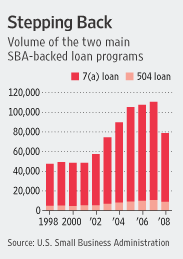(This post ran as my column in this week’s Tennessean).
Given the continued bad economic reports, many entrepreneurs are trying to understand how they should react to the changing conditions. The best answer is — it depends.
How you should position a business for the coming months boils down to four key factors: cash flow, debt load, financial trends and the condition of your specific industry and customers.
As I have written many times before, cash is king. But what does that mean in practical terms?
Given the uncertainty of the economy, entrepreneurs should try to keep enough cash on hand to cover at least 30 days of monthly expenses. Businesses that sell on account should keep an eye on accounts receivable. If customers are taking longer to pay, it will eventually put a strain on cash flow.
I have also been encouraging entrepreneurs to pay attention to debt load. Make sure there is more than enough cash flow to cover monthly bank payments. Also monitor your total debt load using the debt to assets ratio (total debt divided by total assets). In today’s climate the lower this ratio is the better — so try to keep this ratio to less than 0.20.
There are also several key financial trends that need monitoring. Are sales growing or declining? How about profits?
Some businesses will expand
Finally, the condition of your industry and customers will play an important role in determining how you should proceed. If what you sell is a necessity or you offer a greater value than your competitors, you may be somewhat insulated from worsening conditions.
For example, Emma is an e-mail marketing company in Nashville. Emma is gaining new customers even in the current economic decline. They have found that some businesses are seeking ways to advertise and promote at a lower cost with a higher impact.
On the other hand, if your sales are part of a customer’s discretionary spending, keep in mind that your product or service will be the first to get cut or postponed. That is why businesses that sell business office equipment, home furnishings, cars, electronics, and so forth have recently fallen on hard times.
If your business is weak in all four of these areas, it is highly vulnerable to possible failure if conditions don’t improve very soon. Although failure is not inevitable, be realistic and seek counsel from your bankers, attorneys and other advisers.
If your business is weak in some of these factors, it is time to pay attention to the basics — cut overhead, pay down debt, and take good care of the customers you have so you don’t lose any more ground.
However, if your business is relatively healthy in all four of these areas, it may be time to seek opportunities for growth through marketing and even acquisition.

